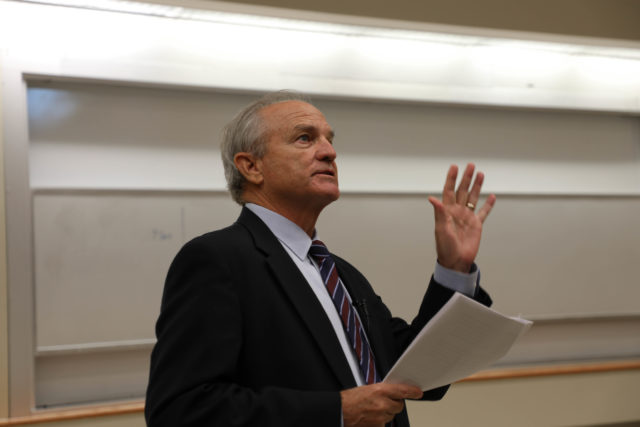By Matthew Muir | Staff Writer
Former congressman Chet Edwards advocated for science to reassume a prominent role in politics at an on campus lecture Tuesday, and he argued that increased funding and education is needed to continue the United States’ legacy of scientific progress.
Edwards, who described himself as a “recovering politician,” previously served in the U.S. House of Representatives and the Texas Senate. Baylor’s College of Arts & Sciences hosted the former Representative Tuesday when he presented his lecture on the “politics of science.” Edwards said scientific advancement is a key component of this country’s identity.
“I believe that science is an absolute key to the kind of nation we are today and a key to what kind of nation we are going to be tomorrow,” Edwards said. “I believe science is important not only for the way it can improve our lives… I’m one of those purists that actually believes in knowledge for knowledge’s sake.”
Edwards said the partisan nature of present-day politics has led to cynicism among the American people, and that this cynicism hurts government-sponsored scientific research.
“We live in a society where the majority of Americans are cynical about government, and it’s very easy for demagogues to simply say all that money spent in Washington by the federal government is just waste, fraud and abuse,” Edwards said. “Skepticism toward our federal government I think is healthy in a democracy. If it bleeds over into cynicism toward our government and government programs, that can be a real threat to scientific research investments by our country.”
To fight this cynicism, Edwards said science professionals must work to raise awareness of the benefits of their work.
“I think there are several things you and I can do and we all have to play our small role,” Edwards said. “First is that those of you who are scientists, will be future scientists, have to feel an obligation to… educate the public about the benefits of your research… Secondly, I think science professors and scientists and science students need to work together to educate more members of congress. There are only 535 members of congress… There are probably about 50 out of those 535 that really have a direct impact on [how much the government will spend] on science research.”
Raising awareness about science was Edwards’ main point. In addition to a cynical view of government, Edwards said the ever-increasing national debt, the prioritization of short-term gains and a lack of public knowledge about science are all obstacles in the way of a resurgence of publicly-funded scientific research.
Edwards said the American public may be more willing to support such endeavors if they knew how many modern comforts could trace their roots back to government programs.
“Most Americans just don’t have a clue about how their lives have benefited from science,” Edwards said. “How many Americans know that when they use their camera, cell phone or GPS, they should thank NASA scientists for that? How many know that memory foam mattresses are the result of NASA research? The reality is that scientific research impacts every one of our lives in a positive way from the time we get up in the morning to the time we go to bed at night.”
Mena, Ark., freshman Christopher Thompson said he found Edwards’ remarks to have an interesting, unique perspective about scientific advancement.
“Coming from another state, I thought it was interesting to hear the perspective of another state’s politician,” Thompson said. “I found his views to be very in line with what I thought would be beneficial to the scientific community. He seemed to really stress that we do have a voice and I think that’s something that I’ll carry with me.”



